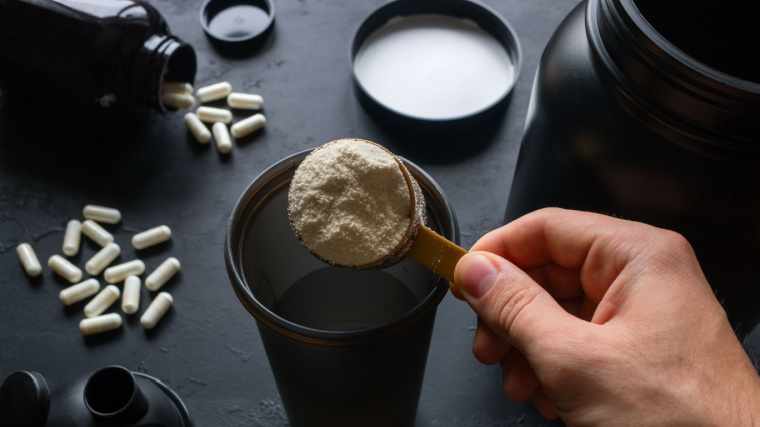A lifelong muscle-building journey can be enjoyable and rewarding, but you’ll likely hit plateaus along the way. After months of training and eating, you may have popped into the supplement aisle to see what could help you with your gains. Progressive overload training and eating in a calorie surplus are essential, but sometimes you need that extra boost.
Eating enough food to reach your caloric intake goals can become time-consuming, expensive, and digestively uncomfortable. Some people’s biological makeup causes them to struggle to keep weight on. While some may opt for a protein powder, those in the latter camp may want to try a mass gainer — a high-calorie dietary supplement that helps you gain weight.

Here, we’ll lay out the pros and cons of mass gainer supplements. You’ll find out if mass gainers are the right choice for you and your fitness journey. We’ve also spoken with a biochemist and an RD to get you all the answers you need. Let’s get into it.
- What Is Mass Gainer?
- Mass Gainer Pros and Cons
- Who Should Take Mass Gainer?
- Who Shouldn’t Take Mass Gainer
What Is Mass Gainer?
Mass gainer is a powdered dietary supplement with high calories, protein, and carbohydrates. When you’re trying to pack on a ton of mass — as in a bulking phase of bodybuilding — you may well run out of steam before hitting your caloric intake goals. Instead of force-feeding another meal, you may want to opt to drink a 1,000-calorie shake.
Mass Gainer Macronutrients
Mass gainers vary by brand but typically contain 500 to 1,500 calories per serving. They’re often higher in protein and carbohydrates while being lower in fat. They tend to have higher carbs because increasing carbs in your daily macros can help with weight gain.
If you’re taking a mass gainer, you’re probably training hard to build muscle. Higher carbs are also helpful for this reason. Carbs get stored as glycogen in your muscles, which your body uses for energy when you do high-intensity training. More glycogen stored may help you train and recover better from the high volume and intensity required for maximum muscle hypertrophy. (1)
To figure out the ratio of macros that may be best for your body while you’re bulking, plug your goals and stats into BarBend’s macros calculator.
Macronutrient Calculator
Mass Gainer Ingredients
The main constant across all mass gainer brands is the high caloric content.
The protein in mass gainers often comes from whey, though some contain blends of casein, egg white, and whey protein isolate. You can also opt for a lactose-free or vegan mass gainer that uses a plant-based protein source.
[Read More: 20 High-Protein, Low-Calorie Foods Worth Subbing Into Your Diet]
Mass gainers tend to contain carbohydrates from maltodextrin. This low-sugar compound comes from wheat, rice, corn, or tapioca. Carbs from rice or tapioca may be gluten-free.
Other ingredients vary, but some add vitamins, minerals, and micronutrients. Mass gainer isn’t a meal replacement, but adding those extra nutrients can make it closer. Some mass gainers add creatine, fats, fiber, and other nutrients. Mass gainer helps you get more calories, not necessarily the nutrients you need for overall health.
Mass Gainer Pros and Cons
Mass gainers can be helpful for people trying to gain weight, but you can’t control the type of weight you gain. Those looking to pack on muscle may gain unwanted fat. Let’s break it down further.
Pros of Mass Gainer
Thinking about loading up your shaker bottle? Here are the top three reasons to try mass gainer.
High in Calories
A single serving of a mass gainer can contain up to 1,250 calories. They’re convenient if you need a high caloric intake for bulking or gaining weight for other reasons. While it’s important to get most of your calories and nutrients through whole food sources, mass gainers are a quick boost.
[Read More: How to Achieve a Calorie Deficit for Weight Loss, Safely]
Especially if you’re in mainstream fitness or nutrition circles, you may have been encouraged to avoid drinking calories. But biochemist Trevor Kashey, Ph.D., gives mass gainers a green light when you’re using them to pack on pounds.
“Drinking calories is totally reasonable,” Kashey says. He continues, discussing building muscle: “Protein plus calories plus progressive overload. On paper, there are no downsides.”
May Help Build Muscle
As Kashey points out, protein, calories, and training with progressive overload are the key components to building muscle. Muscle-building isn’t the primary benefit of mass gainer, but it can help you reach your protein intake goal.
If you’re taking a mass gainer for building muscle, consider choosing one that contains creatine.
[Read More: Mass Gainer Vs. Whey Protein — Which to Choose for Muscle, Weight Loss, and Performance?]
Creatine is an amino acid that helps increase your energy stores — technically known as adenosine triphosphate, or ATP — and leads to better muscular contractions during short bursts of high-intensity exercise, like sprint workouts and weightlifting. Research suggests that creatine as a dietary supplement may help increase lean muscle mass when paired with resistance training. (2)
May Increase Energy Levels
The high carb content in mass gainers boosts your glycogen stores, which can increase your energy levels for training — leading to better workouts and potentially bigger gains over time. (3)
[Read More: These Are the 10 Best Carbs to Eat for Bodybuilding]
Maltodextrin in mass gainers is a simple carb with a high glycemic index. It spikes your blood sugar, which gives you energy and may also help with weight gain. (4)
Cons of Mass Gainer
Mass gainers offer convenience for a high-calorie intake, but there are some potential drawbacks.
Easy to Go Overboard
Building muscle takes time and patience. Some people who feel that they’re struggling to gain muscle end up overeating or drinking too much mass gainer.
“In reality, very few people measure their calories accurately,” Kashey tells BarBend. Unless you’re ensuring that you are tracking your nutrition appropriately, you may wind up using mass gainers when you don’t need them.
Not sure how many calories you need each day to hit your bulking goals while also respecting what your body actually needs? Check out BarBend’s calorie calculator to help you out.
Calorie Calculator
Regarding patience, Natalie Rizzo, MS, RD, adds: “It’s important to realize that muscle gains don’t happen overnight. If you force yourself to have tons of protein at every meal in an effort to gain muscle quickly, you may actually gain fat.” If that’s not part of your plan, you may want to consider your intake increases carefully.
May Cause Unwanted Fat Gain
As Rizzo points out, overdoing it on mass gainer can lead to unwanted fat gain.
“The downside to mass gainers is that muscle doesn’t come on at a measurable rate,” Kashey adds. “So if the idea is to gain weight, it’s fine. If the idea is to gain muscle, then it can be misleading.”
[Read More: How To Lose Fat and Gain Muscle, According to Science]
Dr. Kashey brings up an important point — consuming too many calories in mass gainers helps you gain weight specifically, but you can’t control what kind of weight. However, this may not be a downside if you need to gain weight for medical reasons or aren’t concerned by altering your body composition.
May Cause Gastrointestinal Issues
Many dietary supplements can cause unwanted side effects, mass gainers included. While eating a high volume of food can be digestively uncomfortable, mass gainers can also cause gastrointestinal issues. The most common symptoms are bloating, nausea, gas, constipation, diarrhea, and stomach pain.
If you’re lactose intolerant, opting for a dairy-free mass gainer supplement may help.
Who Should Take Mass Gainer?
You want to get bigger, but you’re not sure which strategy is right for you. So who is mass gainer best for?
“Hard Gainers”
Weight gain may seem simple — eat more calories than you burn. For some people, it doesn’t work that way. “Hard gainers” is a term that refers to people who have difficulty gaining weight. They’re often athletes or highly active, burning so much energy daily that consuming enough is challenging. They may also have faster metabolisms.
Regardless of why a person can’t gain weight, mass gainers can efficiently increase their caloric intake per day.
Bulking Bodybuilders
Competitive bodybuilders and physique athletes may opt for a mass gainer when they’re in a bulking phase. When bulking, you’re trying to pack on as much muscle as possible and may be okay with gaining fat, which you’ll deal with in your cutting phase.
[Read More: The Bodybuilder’s Guide to Transitioning From a Cut to a Bulk]
Just remember that mass gainers aren’t the only thing you’ll need to get you where you’re going. “The best way to gain muscle is to eat a well-balanced diet that consists of fruits and vegetables, whole grains, protein, and healthy fats,” says Rizzo. “Choose high-quality protein, like poultry, fish, soy, beans, and legumes.”
Who Shouldn’t Take Mass Gainer?
Just because you’re aiming to gain weight doesn’t mean you have to go straight to the proverbial mass gainer aisle and stock up. Mass gainers may not be the best bet for the following types of strength athletes.
“Easy Gainers”
Here, we’re referring to the opposite of hard gainers. Everyone’s biological makeup differs; some people gain weight quickly and easily. Whether you’re into bodybuilding or just a gymgoer who quickly gains weight through food intake, a mass gainer may just not be necessary.
People Aiming for Fat Loss or Maintenance
People who are trying to burn fat, gain lean muscle, or maintain their weight may opt for a protein supplement instead. There may be more effective choices than mass gainers when you’re trying to lose fat or maintain body weight.

[Read More: The 7 Best Types of Protein Powders Explained — Which Is Best For You?]
A protein powder like whey protein or a vegan protein powder may be better here. They have a high protein content with typically lower calories and carbs.
Bulking Up
High-calorie mass gainers can come in handy when you’re trying to gain muscle, build overall mass, or gain weight for medical or other reasons. Just be aware that amidst mass gainers pros and cons are the fact that you can’t control what type of weight you gain, so it may come with some unwanted fat. Choose wisely and train hard.
References
- Jensen J, Rustad PI, Kolnes AJ, Lai YC. The role of skeletal muscle glycogen breakdown for regulation of insulin sensitivity by exercise. Front Physiol. 2011 Dec 30;2:112.
- Wu SH, Chen KL, Hsu C, Chen HC, Chen JY, Yu SY, Shiu YJ. Creatine Supplementation for Muscle Growth: A Scoping Review of Randomized Clinical Trials from 2012 to 2021. Nutrients. 2022 Mar 16;14(6):1255.
- Kerksick CM, Arent S, Schoenfeld BJ, Stout JR, Campbell B, Wilborn CD, Taylor L, Kalman D, Smith-Ryan AE, Kreider RB, Willoughby D, Arciero PJ, VanDusseldorp TA, Ormsbee MJ, Wildman R, Greenwood M, Ziegenfuss TN, Aragon AA, Antonio J. International society of sports nutrition position stand: nutrient timing. J Int Soc Sports Nutr. 2017 Aug 29;14:33.
- Hofman DL, van Buul VJ, Brouns FJ. Nutrition, Health, and Regulatory Aspects of Digestible Maltodextrins. Crit Rev Food Sci Nutr. 2016 Sep 9;56(12):2091-100.
Featured Image: Lebedev Roman Olegovich / Shutterstock